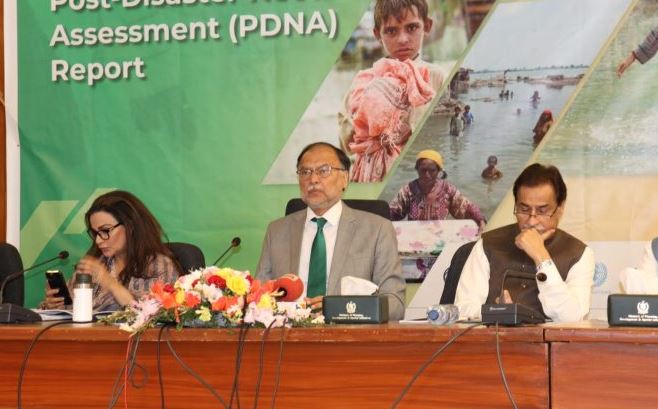Pakistan needs over $16 bn for post flood reconstruction

ISLAMABAD, OCT 28 (DNA) — Pakistan needs at least US$16.3 billion for rehabilitation and reconstruction in a resilient way to support the country’s adaptation to climate change and overall resilience of the country to future climate shocks, said a new report of Post Disaster Needs Assessment (PDNA) launched here on Friday.
The assessment estimates total damages to exceed $14.9 billion, and total economic losses to reach about USD 15.2 billion.
The report shows that housing; agriculture and livestock and transport and communications sectors suffered the most significant damage, at $5.6 billion, $3.7 billion, and $3.3 billion, respectively.
Sindh is the worst affected province with close to 70 percent of total damages and losses, followed by Balochistan, Khyber Pakhtunkhwa and Punjab.
The Ministry of Planning, Development and Special Initiatives led the Post-Disaster Needs Assessment (PDNA), which was conducted jointly with the Asian Development Bank (ADB), the European Union (EU), the United Nations agencies with technical facilitation by the United Nations Development Programme (UNDP) and the World Bank.
The PDNA, in addition to estimating damages, economic losses and recovery and reconstruction needs, also assesses broader macro-economic and human impacts and recommends principles along which it has to develop a comprehensive recovery and reconstruction framework.
The report was launched by Minister for Planning, Development and Special Initiatives Ahsan Iqbal, Minister for Economic Affairs Division (EAD) Ayaz Sadiq and Minister for Climate Change Sherry Rehman.
Addressing the ceremony, Ahsan Iqbal asked International Monetary Fund (IMF) to soften the conditions on Pakistan government to utilize its own resources. He said as per the IMF condition, the government could not spend 40 percent of the allocation approved under Public Sector Development Programme (PSDP) before the last quarter. “I, as a Planning Minister of Pakistan government request the IMF to review such harsh conditionality.
“As the support and help will take time from international community, at least the government of Pakistan should be able to mobilize its own resources to help its own people”, he said adding “I think this condition is very harsh and very unjust because we need to mobilize our own resources to be able to meet the needs of rehabilitation and reconstruction”.
The minister expressed the hope that the IMF would reconsider this condition. “The International community will show its commitment and moral obligation in the donors conference that is suppose to be convened shortly to take more responsibility for reconstruction and rehabilitation of Pakistan’s destruction through climate disaster that will show whether the world truly does climate justice or does not to the all of these poor people and turns a blind eye,” he added.
Federal Minister for Climate Change, Senator Sherry Rehman said that Pakistan has geared up its efforts to make the case for climate justice at the upcoming multilateral climate forum COP27 in Egypt.
“Prime Minister Shehbaz Sharif will address the heads of states during the summit. He will also co-chair a high-level roundtable with the Prime Minister of Norway on the theme of climate change and the sustainability of vulnerable communities, said the Minister. Pakistan will definitely take up this in upcoming COP27 pressing the world community for climate justice as Pakistan one a great victim of that,” she added.
According to the report, the floods affected 33 million people and more than 1730 lost their lives. They are particularly impacting the poorest and most vulnerable districts. The situation is still evolving, with flood waters stagnant in many areas, causing water-borne and vector-borne diseases to spread, and more than 8 million displaced people now facing a health crisis.
The crisis thus risks having profound and lasting impacts on lives and livelihoods. Loss of household incomes, assets, rising food prices, and disease outbreaks are impacting the most vulnerable groups. Women have suffered notable losses of their livelihoods, particularly those associated with agriculture and livestock.
The PDNA Human Impact Assessment highlights that the national poverty rate may increase by 3.7 to 4.0 percent, potentially pushing between 8.4 and 9.1 million more people below poverty line.
Multidimensional poverty can potentially increase by 5.9 percentage points, implying that an additional 1.9 million households are at risk of being pushed into non-monetary poverty.
Compounding the existing economic difficulties facing the country, the 2022 floods are expected to have a significant adverse impact on output, which will vary substantially by region and sector. Loss in gross domestic product (GDP) as a direct impact of the floods is projected to be around 2.2 percent of FY22 GDP. The agriculture sector is projected to contract the most, at 0.9 percent of GDP. The damage and losses in agriculture will have spillover effects on the industry, external trade and services sectors.
The government is providing immediate relief to the impacted communities and supporting their early recovery, while aiming to ensure macroeconomic stability and fiscal sustainability. Moving forward, as recovery and reconstruction spending rises, the loss in output could be mitigated.
Yet, significant international support will be needed to complement Pakistan’s own commitment to increase domestic revenue mobilization and save scarce public resources, and to reduce the risk of exacerbating macroeconomic imbalances.
Although, the early loss and damage estimates may increase as the situation is continuously evolving on the ground, the PDNA lays the groundwork for an agenda for recovery and reconstruction that is designed to build back a better future for the most affected people in Pakistan, the report added.
It said while the recovery will require massive efforts for the rehabilitation and reconstruction of damaged infrastructure, buildings and livelihoods, it will also be an opportunity to strengthen institutions and governance structures.
The report puts forth recommendations for developing a comprehensive recovery framework. While the primary focus will be on the affected areas, such framework presents an opportunity to embed systemic resilience to natural hazards and climate change in Pakistan’s overall development planning.
This tragic disaster can be a turning point, where climate resilience and adaptation, increased domestic revenue mobilization and better public spending, and public policies and investments better targeted to the most vulnerable populations; all figure at the core of policy making going forward.
In the short term, targeted mechanisms such as social assistance and emergency cash transfers, provision of emergency health services, and programs to restore shelter and restart local economic activities, particularly in agriculture, should be prioritized.
Reconstruction and rehabilitation should rest on key principles of: participatory, transparent, inclusive and green recovery for long-term resilience—“building back better”; pro-poor, pro-vulnerable, and gender sensitive, targeting the most affected; strong coordination of government tiers and implementation by the lowest appropriate level; synergies between humanitarian effort and recovery; and a sustainable financing plan.
Given Pakistan’s limited fiscal resources, significant international support and private investment will be essential for a comprehensive and resilient recovery. The Pakistani authorities are committed to accelerate reforms to generate additional domestic fiscal resources and improve efficiency and targeting of public spending.
Beyond the immediate needs of floods reconstruction, these reforms, while protecting the most vulnerable, will be important to generate fiscal space to invest more broadly into more climate-resilient infrastructure and adaptation to climate change, as well as to build buffers to face future shocks, while addressing macroeconomic imbalances.
This commitment of the government will also be key to mobilize further international support as well as to unlock private sector sources of financing—both of which will be absolutely critical to face the current climate change-induced shock.
The ADB, the EU, the UNDP and the World Bank are fully committed to working with the government and the people of Pakistan during the ensuing recovery phase, and to increase the country’s climate resilience, a press release issued by the World Bank said. =DNA
Related News

Decision taken to include Islamabad airport in privatisation programme
ISLAMABAD, JAN 24: A decision has been taken to include Islamabad International Airport in theRead More

Uzbekistan, Pakistan: Strategic partnership toward regional stability and integration
ISLAMABAD, JAN 24: A roundtable discussion titled “Uzbekistan- Pakistan: Bridging regions and creating new opportunities”Read More


Comments are Closed